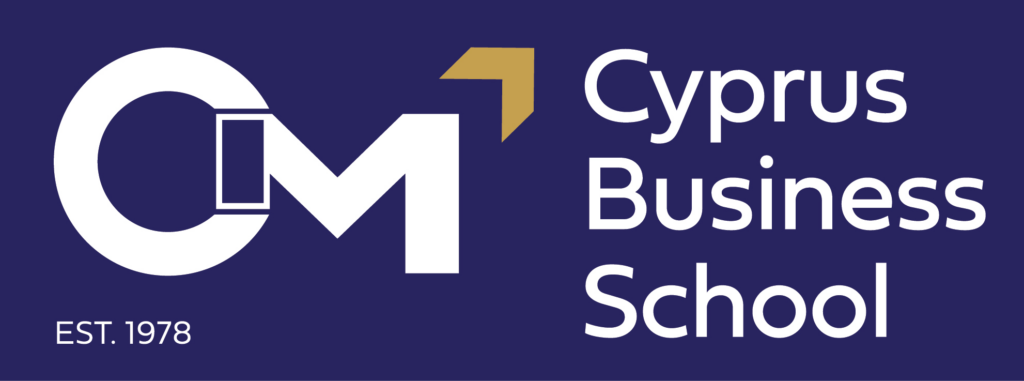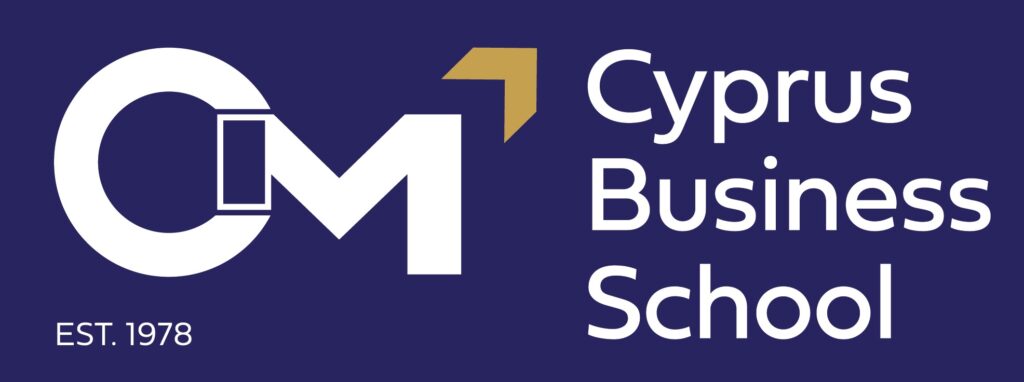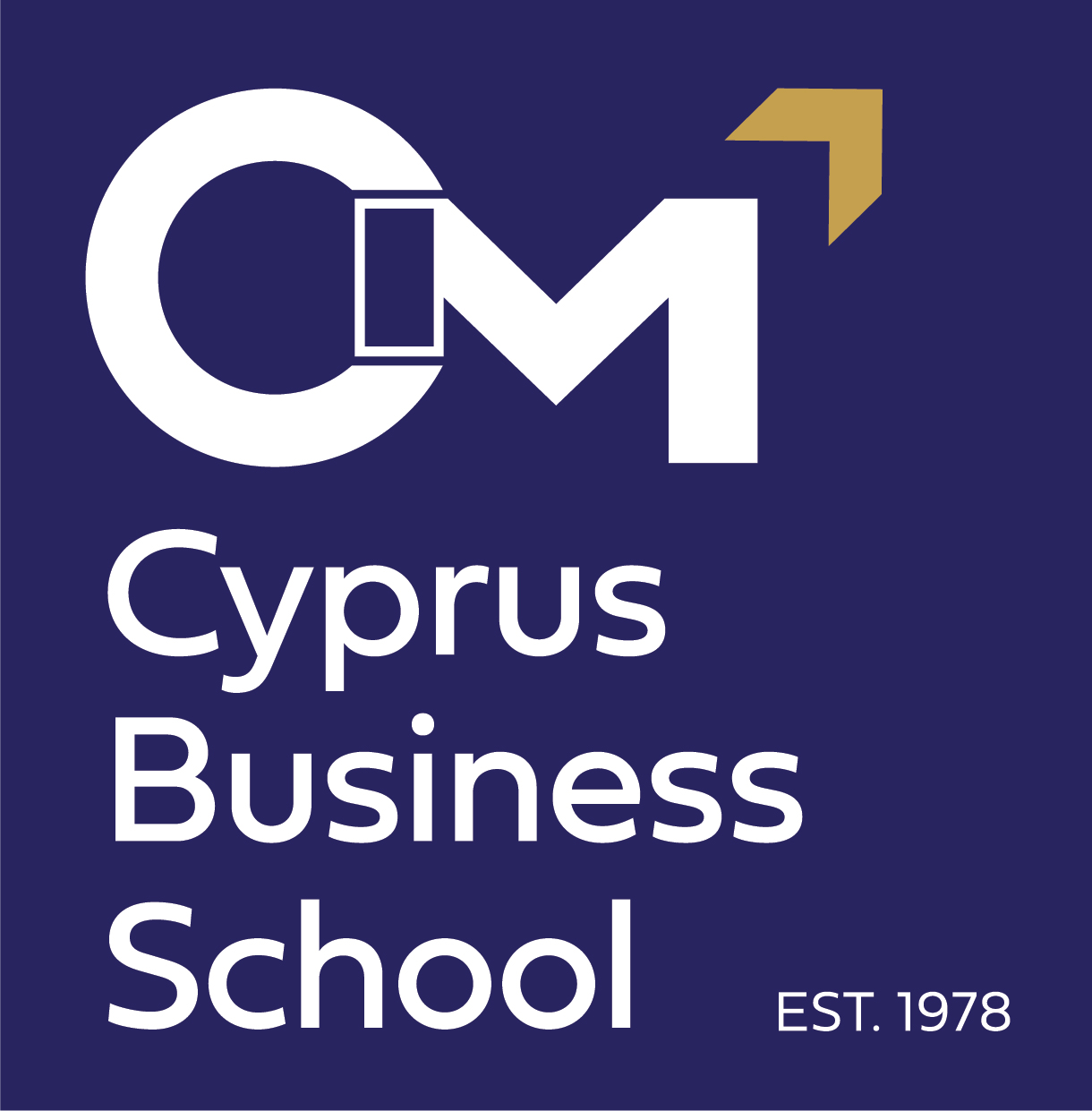Master of
Business Administration
(E-Learning)
(18 Months )
This e-MBA has its own dedicated website.

The brand new e-Learning MBA programme by CIM-Cyprus Business School is a distance-learning Masters that combines flexibility with in-depth study of the latest analytical and strategic management skills.
This e-Learning MBA, developed by expert academics and seasoned industry professionals, brings together CIM’s decade-long experience in distance learning, its close connection with industry, innovative teaching methodologies, and its long and proven commitment to working individuals.
The e-Learning MBA from CIM covers ideas and concepts derived from a wide range of business-related fields, enabling students to respond creatively and effectively to the challenges of the global business environment.
Key features
- A coherent and integrated course of study that appeals to in-career and ambitious graduates who want to learn how to operate within increasingly complex, dynamic and diverse external environments;
- An innovative and carefully-curated programme that will spark students’ intellectual acumen and promote synthesis, reflection, and analysis of complex and changing environments and build graduates’ practical management competence through engagement with business;
- A course that pays particular attention on students learning to plan, develop, and implement executive responses to changing environments, using an interdisciplinary approach to management.
- Classes led by lecturers with intimate knowledge of different international contexts and experience at top international universities
- A course that mixes independent study, webinars, tutorials, one-to-one meetings, group work, and opportunities for enterprise visits (physical and virtual), and which promotes creative and entrepreneurial approaches to problem solving.
- Consisting of a set of core subjects, a selection of elective modules, and an individual Capstone Project based on experiential learning.
- Option for a non-credit preparatory module, ensuring students will be fully equipped with key study skills
- Custom-made state-of-the-art learning platform called GATE, expertly designed and maintained to ensure an engaging and interactive experience
- A wealth of e-resources and CIM’s famous administrative and academic support throughout
GATE
For the purposes of the e-Learning MBA, the CIM e-Learning Unit designed a purpose-build platform called GATE.
This platform is an interactive social hub where learning happens in a social and constructivist way.
GATE incorporates recorded lecturers, activities, discussion forums and is seamlessly connected with the CIM intranet, through which students monitor and manage their studies. On GATE, students interact with faculty. GATE provides regular prompts for online discussion as well as many opportunities for interact and co-creation
Programme design & structure
Effective management requires a combination of broad strategic management knowledge and specialist analytical skills.
The core subjects of the CIM e-Learning MBA cover essential areas of general management while optional modules and the individual Capstone project enable students to build and apply knowledge gained on these core areas.
All courses draw on work-related, work-based, and work-integrated learning. The curriculum of the programmes has been designed with employability at its core. Employability skills are embedded in every module of the programme. Both compulsory modules – Strategic Management, Organisational Behaviour, Economics & Financial Management, Entrepreneurship & Innovation, and Research Methods, and – and all elective modules emphasise applicable skills and the crafting of professionals who will thrive in all business management roles.
E - learning methodology
Our e-learning methodology, developed and refined over several years, draws on the most tested and effective models of online teaching and is based on five important pillars:
- Access and Motivation, ensuring a welcoming, communicating and motivating approach and philosophy for all;
- Online Socialisation, ensuring that all students participate actively and learn from each other;
- Information Exchange, ensuring that all lecturers explain and summarise each session’s learning outcomes and check understanding at all stages;
- Knowledge Construction, ensuring a golistic approach to learning and the combination of different teaching methods and techniques;
- Development, ensuring that all students benefit from individual plan development and close monitoring of their performance and progress.
Capstone Project
This e-Learning MBA includes a compulsory Capstone Project.
Capstone Projects are included in some of the world’s top MBAs and are increasingly used by educators instead of the traditional dissertation. They are experiential projects where students take what they have learnt throughout the course of their programme and apply it to a specific idea or case study. In designing a Capstone Project, we were mindful of offering a culmination of learning gained at the time of the project start (the synthesis, integration, and application of acquired knowledge) rather than the acquisition of still further new knowledge. The CIM e-Learning MBA programme is geared towards working professionals; Capstone Projects give students the ability to take the knowledge and theory they have learned and apply it in a real-world setting, communicating this impact appropriately in written and spoken forms. A specialist tutor will be with you throughout this process.
Group work
What makes us unique at CIM is the emphasis we put on team work and on making our students feel welcome and empowered. A fundamental part of students’ learning and development is participation in peer-led virtual group work. Group exercises and group discussions (e.g. conferencing, forum discussions, creation of group padlets) are a feature of all modules and ensure that students never feel alone in their learning journey.
Course content
The course is made up of five compulsory modules and five electives (from which you choose two). In addition, there is a compulsory Capstone Project. All modules carry 12 ECTS. The Capstone Project carries 18 ECTS.
- Delves into key management theories that result in organisational effectiveness, efficiency, and human resource development
- Addresses issues such as workforce motivation, incentives, team building and office environments and how we can best manage the dynamics of organizational change
- Examines contemporary principles, techniques and research findings in management and organisational behaviour that are driving high performance and continuous improvement in business today
- Provides deep understanding of management and organisational behaviour concepts associated with continuous improvement in individual and group processes
- Emphasises value and process of strategic management
- Helps students integrate and apply their prior learning to strategic decision making in organisations
- In-depth examination of an organisation’s vision and mission and of principles, techniques and models of organisational and environmental analysis
- Explores the theories and practices of strategy formulation and implementation
- The Economics component provide students with a foundation of economic understanding and knowledge so as to grasp the implications for businesses of changes in the economic environment
- It also develops students’ ability to use economic understanding and knowledge in examining and assessing a number of microeconomic and macroeconomic issues.
- The Financial Management component covers the basic areas of financial management of fundamental interest to corporate managers and helps students understand the basic principles needed to implement financial decisions both inside and outside the firm.
- Introduces students to the various processes and considerations of managing new product development and creating new ventures, including, for example, identifying opportunities for innovation, Building business models to extract maximum value from innovative ideas, and financing new ventures
- Helps students develop new skills and knowledge about innovation that will enhance their ability to contribute to the long-term competitiveness of businesses
- Ensures students understand the link between entrepreneurial activity and economic development
- Enables students to understand business research, offering an in-depth understanding of relevant approaches and elements of undertaking a research enquiry;
- Provides students with the necessary skills and knowledge to determine the information necessary to address identified research problems
- Helps students develop critical core competencies and skills including: defining research questions; setting appropriate research objectives; study design that incorporates research objectives and budgetary constraints; secondary and primary data collection and instruments; sampling and analysis methods; and effective reporting of results; as well as the importance of ethical conduct in conducting research in both a domestic and in international business contexts
Offers comprehensive managerial and practical introduction to Marketing
Ensures students understand marketing strategies and the elements of marketing analysis, customer analysis, company analysis and competitor analysis
Offers in-depth knowledge of elements of the marketing mix (product, pricing, promotion, and distribution strategies) and of different ways of promoting products and services through new marketing methods
Teaches students to design and implement marketing plans
Investigates corporate social responsibility (CSR) and sustainability informed by ethical theory and stakeholder perspectives
Draws on key principles, theories, and key issues raised by stakeholder groups
Builds in-depth understanding of contemporary social issues in business by highlighting the importance of a collaborative approach with internal and external stakeholder groups.
Reviews International Trade theory and examines how culture influences international business decisions
Explores how all functional business areas (operations, marketing, management, accounting, finance, human resources and law) change in international settings
Provides thorough review and analysis of the international trade and business environment and teaches students how to apply this knowledge to practical aspects of doing business in international markets
Introduces students to the concepts, principles, problems and practices of operations management and pays emphasis on managerial processes for effective operations
Offers in-depth look into operations strategy, process design, capacity planning, facilities location and design, forecasting, production scheduling, inventory control, quality assurance and project management
Introduces students to key theories and practices of International HRM
Critically examines the influence of national institutions and culture on the choice and effectiveness of HRM practices.
Invites reflection of the role of HRM policies and practices in achieving desired employee and organisational outcomes
Discusses challenges and opportunities firms face in managing people and workplaces at the global level.
- Synthesises student learning in a single practical real life project that demonstrates the fulfilment of the programme’s learning outcomes.
- Enables a demonstration of business research with a potential real-world outcome and integrates student academic knowledge with experiences beyond the virtual classroom and combine developing knowledge, skills, and personal interests.
Capstone projects may take a wide variety of forms, but most are long-term investigative projects that culminate in a final product, presentation, or performance. For example, students may be asked to select a topic, profession, or social problem that interests them, conduct research on the subject, maintain a portfolio of findings or results, create a final product demonstrating their learning acquisition or conclusions (a paper, short film, or multimedia presentation, for example), and give an oral recorded presentation on the project to a panel of instructors, experts, business persons and broader community members who collectively evaluate its quality.
Capstone projects are generally designed to encourage students to think critically, solve challenging problems, and develop skills such as oral communication, public speaking, research skills, media literacy, teamwork, planning, self-sufficiency, or goal setting—i.e., skills that will help prepare them for modern careers, and adult life. The projects are also interdisciplinary and may require students to apply skills or investigate issues across many different subject areas or domains of knowledge. Capstone projects also tend to encourage students to connect their projects to community issues or problems, and to integrate “outside-of-school” learning experiences, including activities such as interviews, scientific observations, or internships.
All e-Learning students will given in-depth training of how to use the custom-made learning platform GATE as well as CIM’s state-of-the-art intranet platform.
In addition, all e-Learning MBA students will be offered the opportunity to complete a fast-track optional Academic Skills Development module.
This module is designed for students requiring academic skills enhancement prior to commencing their studies. The focus is on developing and refining the skills required for postgraduate study in Cyprus. All students will have the chance to develop their communication and research skills through the course, including as part of the Research Methods module. This optional course is intended to ease students into the learning strategies needed for the successful achievement of an MBA.
The course takes place over four weeks, twice a week (for a total of four hours per week). All classes will be recorded and will be available for students to go revisit on GATE.
Assessment
The Research Methods module is assessed as follows:
- Academic Journal Paper Review (weighed at 10%, due end of Term 1)
- Individual poster presentation (weighed at 20%, due late Term 2)
- Two e-tivities (10% each, total 20%)
- Research Proposal (weighted 50%, end of year)
The Capstone Project is assessed as follows:
- Pecha Kucha of the skill development and learning gained through the project (10%)
- Capstone Project Report (90%)
All other modules are assessed as follows:
- 1 Case Study Assignment (weighed at 20%)
- 4 E-tivities (weighed at 5% each, total of 20%)
- 1 Final Examination (weighed at 60%)
Share to:







